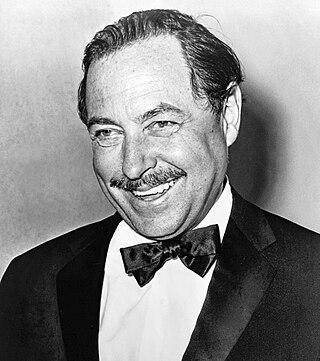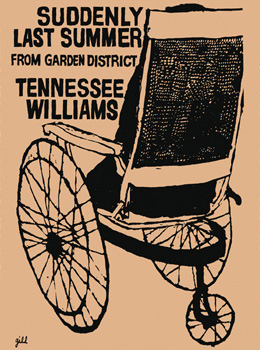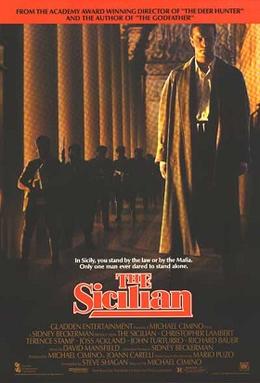
Thomas Lanier Williams III, known by his pen name Tennessee Williams, was an American playwright and screenwriter. Along with contemporaries Eugene O'Neill and Arthur Miller, he is considered among the three foremost playwrights of 20th-century American drama.

Eugene Luther Gore Vidal was an American writer and public intellectual known for his acerbic epigrammatic wit. His novels and essays interrogated the social and sexual norms he perceived as driving American life. Vidal was heavily involved in politics, and unsuccessfully sought office twice as a Democratic Party candidate, first in 1960 to the United States House of Representatives, and later in 1982 to the United States Senate.

Suddenly Last Summer is a one-act play by Tennessee Williams, written in New York in 1957. It opened off Broadway on January 7, 1958, as part of a double bill with another of Williams' one-acts, Something Unspoken. The presentation of the two plays was given the overall title Garden District, but Suddenly Last Summer is now more often performed alone. Williams said he thought the play "perhaps the most poetic" he had written, and Harold Bloom ranks it among the best examples of the playwright's lyricism.

Caligula is a 1979 erotic historical drama film about the rise and fall of Roman Emperor Caligula. The film stars Malcolm McDowell in the title role, alongside Teresa Ann Savoy, Helen Mirren, Peter O'Toole, John Steiner, and John Gielgud.

In the Mouth of Madness is a 1994 American supernatural horror film directed and scored by John Carpenter and written by Michael De Luca. It stars Sam Neill, Julie Carmen, Jürgen Prochnow, David Warner and Charlton Heston. Neill stars as John Trent, an insurance investigator who visits a small town while looking into the disappearance of a successful author of horror novels, and begins to question his sanity as the lines between reality and fiction seem to blur. Informally, the film is the third installment in what Carpenter refers to as his "Apocalypse Trilogy", preceded by The Thing (1982) and Prince of Darkness (1987).

Robert Foxworth is an American film, stage, and television actor.

Ben-Hur is a 1959 American religious epic film directed by William Wyler, produced by Sam Zimbalist, and starring Charlton Heston as the title character. A remake of the 1925 silent film with a similar title, it was adapted from Lew Wallace's 1880 novel Ben-Hur: A Tale of the Christ. The screenplay is credited to Karl Tunberg, but includes contributions from Maxwell Anderson, S. N. Behrman, Gore Vidal, and Christopher Fry. The cast also features Stephen Boyd, Jack Hawkins, Haya Harareet, Hugh Griffith, Martha Scott, Cathy O'Donnell, and Sam Jaffe.
Gavin Lambert was a British-born screenwriter, novelist and biographer who lived for part of his life in Hollywood. His writing was mainly fiction and nonfiction about the film industry.

Hard Candy: A Book of Stories is a collection of short stories by American writer Tennessee Williams, which was first published in 1954 by New Directions.

Alison Fraser is an American actress, voice actress and singer who has appeared on Broadway, Off-Broadway, and in television and film. In concert, she has performed at such venues as Carnegie Hall, The White House, Town Hall, The Brooklyn Botanic Garden, The Tisch Center for the Arts, The Folger Shakespeare Library, The Wilma, The Emelin, Joe's Pub, 54 Below, and Symphony Space.

The Sicilian is a 1987 epic historical crime film directed by Michael Cimino. The film was adapted by Steve Shagan, and later rewritten by Cimino and Gore Vidal from Mario Puzo's 1984 novel of the same name. Christopher Lambert stars as Salvatore Giuliano, the infamous bandit who tried to liberate early 1950s Sicily from Italian rule. The film also stars Terence Stamp, Joss Ackland, John Turturro and Barbara Sukowa.

Donald Windham was an American novelist and memoirist. He is perhaps best known for his close friendships with Truman Capote and Tennessee Williams. Born in Atlanta, Georgia, Windham moved with his then-boyfriend Fred Melton, an artist, to New York City in 1939. In 1942 Windham collaborated with Williams on the play, You Touched Me!, which is based on a D. H. Lawrence short story with the same title. Windham received a Guggenheim Fellowship in 1960.

Denham "Denny" Fouts was an American male prostitute and socialite. He served as the inspiration for characters by Truman Capote, Gore Vidal, Christopher Isherwood, and Gavin Lambert. He was allegedly a lover of Prince Paul of Greece and French actor Jean Marais.

Last of the Mobile Hot Shots is a 1970 American drama film. The screenplay by Gore Vidal is based on the Tennessee Williams play The Seven Descents of Myrtle, which opened on Broadway in March 1968 and ran for 29 performances.
John Uecker was an American actor and theatre director, who is best known for his work with the writers James Purdy and Tennessee Williams.

Travis Michael Flores was an American writer, activist, philanthropist, and motivational speaker, best known for being an advocate of cystic fibrosis and queer youth. He was a published children's book author and wrote for several magazines and publications, including OUT, UpWorthy, and DoSomething. He has been featured in works such as Chicken Soup for the Soul, Reader's Digest: Selections, Charlie's Cancer Rescue,The Lemonade Stand, and The Key Of Awesome as a parody of One Direction singer Liam Payne
Maria Britneva, Baroness St Just, known as Maria St Just, was a Russian-British actress who was a close friend of Tennessee Williams. As co-trustee of the trust which he set up for his sister, she became his literary executor.
Sylvester & Orphanos was a publishing house originally founded in Los Angeles by Ralph Sylvester, Stathis Orphanos and George Fisher in 1972. When Fisher moved to New York City, Sylvester & Orphanos specialized in limited-signed press books.

Sweet Bird of Youth is a 1989 American made-for-television drama film directed by Nicolas Roeg, starring Elizabeth Taylor and Mark Harmon. Adapted from the 1959 Tennessee Williams play of the same name by Gavin Lambert, it focuses on the relationship between a drifter and a faded movie star.
“Desire and the Black Masseur” is a work of short fiction by Tennessee Williams first appearing in the collection One Arm and Other Stories, published by New Directions in 1948.














